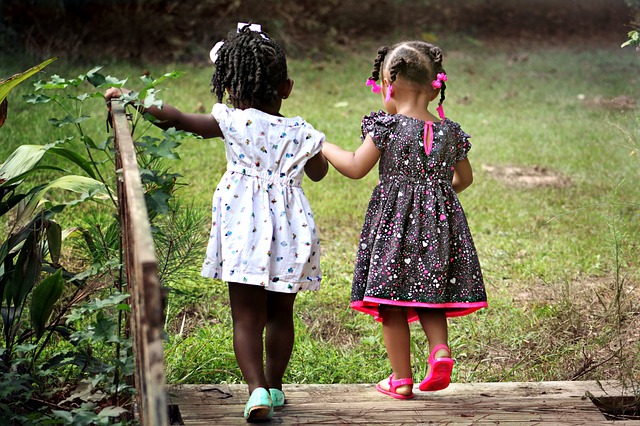How To Build Friendships And Maintain Them.

Unfortunately, friendships seem to come and go. People and situations change, which can be a challenge when trying to build friendships.
Friendships can be fragile and require time and energy to be at their best.
Making friendships a priority can help to overcome these challenges.
While it’s not entirely under our control, there are many things you can do to strengthen and preserve friendships.
It’s also important to stop doing the things that weaken your friendships. None of us are perfect friends.
Ask yourself what you can do to be a better friend.
Could you be more patient? More available? Less self-centered? Take a look at yourself and try out some positive changes.
How many friends have you lost track of over the years? How many of your friendships are weaker than they used to be?
Unless you’ve intentionally tried to strengthen your friendships, they’re not as strong as they could be.
Make your friendships a priority and do what you can to preserve and strengthen them. You’ll be glad you did!
Why It’s Important to Have Healthy Friendships

Friendships are essential to our mental health and happiness. When things are going well in life, we often share our joys with them.
Conversely, friends can help us through difficult times by empathizing with our feelings and providing advice or simply listening.
Having a solid network of friends can enrich our lives in countless ways.
However, most people don't appreciate the importance of friendship until theirs is damaged or strained.
To prevent this, it's essential to develop and maintain healthy friendships throughout our lives.
Here are some essential reasons why it’s important to have healthy friendships:
1. Friends can make you feel good about yourself.
It’s essential to have friends who make you feel good about yourself. These are the people who will be there for you no matter what and will always have your back.
They know how to make you laugh, even when you don’t feel like it, and they can help boost your self-confidence.
If you’re feeling down, spend time with your friends and let them remind you of all the great things about you!
It would be best if you also tried to be a good friend to others.
Be there for them when they need you and help them feel good about themselves.
Reciprocity is a critical component of healthy friendships.
2. Friends can help you through tough times.
Everyone goes through tough times in their lives. It’s helpful to have friends who can support you and be there for you during these difficult periods.
They can offer a shoulder to cry on, lend a listening ear, or be there for you when you need them.
If you’re going through a tough time, reach out to your friends. Let them know what you’re going through and how they can help.
And, if one of your friends is going through a tough time, be there for them, too. Show them you care and offer your support.
3. Friends can broaden your perspective and enrich your life.
It’s easy to get stuck in your world. But when you have friends, they can help expand your view and enrich your life.
Friends can introduce you to new experiences, hobbies, and people. They can help you see the world differently and improve your life.
To broaden your perspective, build a diverse network of friends from different backgrounds and cultures.
Be open-minded and curious about your friends’ experiences. You might learn something new!
4. Friends are important for your overall health and well-being.
According to recent studies, having healthy friendships is important for your overall health and well-being.
Friends can help reduce stress, improve mental health, and boost your immune system. They can also help you live longer!
Cherish and nurture your friendships. They’re good for you in so many ways! Nurture your friendships in the following ways:
First, spend quality time with your friends. It means setting aside time to talk and connect with them without distractions
Second, be there for your friends when they need you. Be a good listener and offer support when they need it most.
Last, express your appreciation for your friends often. Let them know how much you care about them and how much they mean to you.
Maintain trust and communication in your friendships, and you’ll reap the many benefits that come with having healthy friendships!
Healthy friendships are essential for your well-being. They can strengthen your mental and physical health, help you through tough times, and broaden your perspective.
So, cherish your friends and nurture your friendships!
Let them know how much you appreciate them and be there for them when they need you. You’ll both benefit from having a healthy friendship!
Finding and building New friendships
Whether you've always been the life of the party or a wallflower, you can find and build new friendships.
As we get older, it becomes challenging to make more friends.
But anyone can have a full and rewarding social life - even if you don't have a single friend at the moment.
Try these strategies to enhance your social life today:
1. Get out of the house.
Potential friends aren't going to line up and knock on your door. There are many ways to meet new people.
Volunteer for a cause that's meaningful to you. You're likely to run into people with similar interests.
Join a club. Meetup.com is a good place to look for others that share your interests. You can stay as busy as you like.
There are groups that meet for soccer, meditation, card games, and anything else you can imagine.
Ask coworkers to go out. Get a group together and have dinner or walk on the local trail.
More people are sulking at home than you think. Help yourself and someone else enhance their social life.
2. Be real.
Avoid the trap of believing that you need to pretend to be more interesting, funny, or cool.
You'll be forced to either keep up the act long-term, or lose your new friends because you misled them.
It's too much work to pretend to be someone else. Have the courage to be yourself.
3. Determine the type of friend you want.
The person you say "hi" and "bye" to in the next cubicle isn't the same type of friend you'd turn to when your favorite cat is run over by a car.
Are you looking for casual friends to meet for happy hour on Thursday nights? Or do you want another close friend to share life's ups and downs? *
There's no right or wrong answer, but you can't find it if you're unable to define it. Think about what you need more in your life right now.
4. Avoid being afraid.
You might feel intimidated when meeting new people. Or you're afraid of rejection.
Will you be able to maintain a conversation? These are common fears. They're also unnecessary.
Others are consumed with the same fears. They don't have enough mental space left to judge you.
The people that judge or reject you aren't good friendship material anyway.
Visualize yourself confidently approaching a group of people. See the group accepting you with open arms.
Keep performing this exercise until it feels believable. Then go out and do it.
5. Allow the friendship to grow.
Hanging out once won't result in a solid friendship. Keep in touch with the people you enjoy.
It takes time and frequent interaction to build a true friendship.
Avoid letting the good ones slip away.
6. Keep an open mind.
You might have an image of the perfect friend burned into your mind, but be open to other possibilities.
The best friend you've yet to meet might be completely different.
Give everyone a chance to be a friend. Keep your mind open.
7. Be persistent.
Keep going out until your social life is full. It might take a while, depending on your social skills.
But even the most socially awkward of us can find and keep friends. Stick with it until you're satisfied.
Friendships add an additional layer of enjoyment to life. We all need friends for camaraderie and general socializing.
Close friends are a true gift.
Life is better when you have at least one, good, close friend. Get out there and meet a few new people.
Why Is Friendship So Hard? Valuable Tips for Stronger Friendships

It’s normal to feel jealousy and envy in your friendships. You know each other too well, right?
That's why when even a hint of trouble comes up, betrayal is quick to follow.
These emotions, however, do not help strengthen the bonds of friendship.
Fortunately, there are ways to turn "friendship wars" in your favor.
Try to approach your friend without getting emotional and without taking sides.
Be enthusiastic and open-minded about trying new things with them.
By showing that you're happy and willing to spend time with them, you're assuring them that they're still an essential existence to you.
Keep these ideas in mind to build stronger friendships:
1. Create and relish opportunities to spend time together.
It would be nice if friendships didn't require lots of time to bond, but that's the way it works. That's the beauty of relationships.
It's like planting a tree – the tree needs time to grow its roots deep, but when it does, it's steady.
The benefits of stronger relationships can last a lifetime. So set a goal for each week to plan one fun activity with your pal.
Check in with them from time to time, text them once in a while, and let them know you're thinking of them.
These activities may seem small, but they'll make a big difference in your friendship.
2. Always remain honest with your friends.
Probably the most crucial element in a strong friendship is trust. Each person needs to trust that the other person will remain open with them.
That means not dangling small lies in their face for no particular reason. Honest friends find it easier to fix a rough patch at the core. They can talk things out and resolve them.
Building a solid foundation for friendship is the most important thing you can do.
3. Show vulnerability.
Many people today find it very difficult to show their vulnerability. They assume that this will lead to failure or rejection.
People also avoid showing their vulnerable side because of a specific image they want to present to the world. But it's not a good idea to give a particular impression because that will limit you from growing.
Keeping up appearances is a big mistake. Be authentic and vulnerable.
This shift will attract people who are empathetic toward you. And for good friendships, the opposite is true.
Being vulnerable shows the other person that you have confidence in them, and they, in return, will have faith in you.
4. Don't take advantage of your friends.
We all like kind, generous, and trustworthy people, and we must always strive to be like that.
But sometimes we don't want to take our friends seriously. As a good friend, it’s important to avoid taking advantage of your friend's weakness.
Love your friend as much as yourself. When you take advantage of your friends, they come to resent you.
Your friends, like family, need you in their lives.
If they can trust you, they will rely on you. You owe it to them to try your best to look out for their best interests.
Also, it’s important to be a good listener. When you listen, you show your friend that you care about their problems and are willing to do anything they ask.
If you listen carefully, you figure out what they need and how you can help. This practice makes them feel important.
In the end, it all comes back to trust. If your friend trusts you, he will stick with you through the good and bad times.
How to Invest in the Best Friendships Through Loyalty, Generosity, and Service

We all know that strong friendships are essential to a happy and fulfilling life.
But what does it take to build and maintain those relationships?
According to researchers, investing in friendships requires three key things: loyalty, generosity, and service.
Investing in a friendship means being there for your friend during the good and bad times.
It’s about being loyal to them, being generous with your time and resources, and serving them well.
When you invest in a friendship, you are committing to that person.
And just like any other investment, the more you put into it, the more you will get out of it.
Here are some ways you can be there for your friend during good times and bad:
1. Be loyal to them.
This means being honest with them, supporting them, and standing by them even when it’s complicated. Be generous with your time and resources.
This means making time for them, listening to them, and helping them out.
2. Serve them well.
This means doing things they can’t or don’t want to do for themselves.
It could be something as simple as running an errand or cooking them dinner when they’re having a tough day.
The benefits of investing in friendships are many. Studies have shown that people with strong social relationships are happier, have better mental health, and live longer.
So if you want to be happy and healthy, start by investing in your friendships.
Here are some benefits of investing in friendships:
1. Increased happiness.
When you have strong friendships, you have people to rely on and share your joys.
2. Improved mental health.
Friendships can provide emotional support during difficult times. They can also help reduce stress, anxiety, and depression.
3. Longer life.
Studies have shown that people with strong social relationships live longer.
It is likely because they have someone to rely on and support them during difficult times.
Loyalty is one of the most important aspects of any friendship. When you are loyal to your friends, you are there for them, no matter what.
You stick by them through thick and thin. You don’t gossip about them behind their back or betray their trust.
Loyalty is the foundation upon which strong friendships stand.
Here are some examples of ways to be loyal to your friends:
1. Stand up for them when they are not present and be honest with them.
Keep their secrets and be there for them when they need you.
2. Being generous with your time and resources is another important way to invest in a friendship.
When you are generous with your friends, you give of yourself, expecting nothing in return.
You are there for them when they need you, and you are always willing to help. Generosity creates a strong bond between friends and builds trust.
Here are some examples of ways to be generous and serviceable to your friends:
Listen to them when they need to talk, help them out when they are in need, help them out when they are in need, and give them your time and attention.
Service is another meaningful way to invest in a friendship. When you serve your friends, you always look out for their best interests.
You put their needs above your own, always there for them. Service is the ultimate act of friendship, and it creates a strong bond between friends.
Here are some examples of ways to serve your friends:
Offer to help them with difficult tasks when they are sick or need help. Offer to look after their kids when they need support and bring food and clothing if they are in a crisis.
Building strong relationships with the people who matter most to you is essential to a happy and fulfilling life.
By investing in your friendships and being loyal, generous, and serviceable, you can create lasting bonds to improve your mental and emotional health.
So, start today by reaching out to your friends and letting them know how much they mean to you.
Indicators of a True Friendship

You've probably realized that friends come and go.
In some cases, your interests change as you get older.
In other cases, something happens that forces you to part ways with those you once considered friends.
At the end of the day, however, you can identify the friendships that have a real foundation.
Identify these truths in your relationships to determine which ones represent true friendship:
1. Friendship withstands disagreements.
Anybody you consider a true friend can attest to the fact that disagreements undoubtedly happen.
But that person can also confirm that your bond withstands those disagreements.
True friends know that regardless of the differences or disagreements, the foundation of the relationship still exists.
A sign of true friendship is when two people continue to live well with each other after a disagreement.
2. Friends keep it real.
The beauty about friendship is that there is rarely any pretense. Friends share their vulnerabilities with each other.
They trust that their quirks are accepted by each other.
Your true friends hardly worry about what you think of their actions or behaviors.
They know that if there's one person in the world who understands them, it's you!
It's also safe to say that your real friends avoid sugar-coating anything they're saying to you. Expect to get their opinion as real as it comes!
3. Confidentiality is respected.
When the matter of confidentiality comes up, you can tell a friend by whether your request for confidentiality is respected.
True friends acknowledge the importance of maintaining your trust.
With true friends in your life, you can feel comfortable sharing your deepest secrets.
Your secrets will be just as safe with friends as they are when you keep them to yourself.
Your private space is important to you, and a genuine friend understands that.
They understand when to step aside and give you the time you need. And they do this without feeling offended.
4. Support is unconditional.
It's true that friends sometimes have different interests and beliefs. But even when viewpoints are different, true friends still offer support to each other.
Friends usually offer advice to each other. And even when the advice you get is different from what you want to hear, you know it's coming from a genuine sentiment.
If you need someone to lean on when you're going through a rough spot, your real friends instinctively know.
They'll show up when you least expect it and bring loads of hugs with them!
5. Achievements are celebrated.
It's unlikely that you'll find a true friend who doesn't celebrate your achievements. The questionable friends may feel envious of your success.
But true friends get just as excited as you do about your victories.
You'll likely even find a true friend helping you prepare for an upcoming job interview.
Even if it's a success they want for themselves, they're happy just knowing you stand a good chance of being the victor.
Sincere friends take the time to congratulate each other. They give gifts, treat each other to dinner, and make other special gestures.
They like to show that they care. Have you identified anybody who embodies a true friend after looking at these indicators?
If you have, latch on to that person as long as you can!
A genuine friend can be difficult to find. You'll find great joy when you nurture your friendships.
Commit to being the kind of friend to others as you want them to be to you. Friendship works both ways!
Try these ideas to Build friendships stronger than ever:

1. Stay in touch.
Reach out to your friends regularly. They’ll be much more likely to stay your friends over the long term.
2. Think about what your friend needs right now.
Everyone has a challenge or two they’re facing. How can you help?
Let them know you’re available and concerned. This is a big part of being a good friend.
3. Avoid judging.
You won’t approve of anyone 100% of the time, not even yourself. Your friend will make choices you don’t agree with, and that’s okay.
They don’t approve of everything you do, either. Give your advice when asked and be supportive.
4. Give an occasional compliment.
We could all use a little confidence booster now and then. Be the one to give it.
Your friends will appreciate it, and you might even get a few more compliments in return.
5. Spend time together.
Absence weakens relationships. Friendships need time and attention to thrive.
When do you have time this week to spend time with the friends that mean the most to you?
6. Find common interests you can share.
Sitting and talking is great, but there are a lot of other things you can share.
Be
active with your friends. Eat meals,
watch movies, work out, or go shopping together.
7. Take on a challenge together.
You become closer to those you suffer with. This is one of the reasons military buddies tend to have such strong relationships.
But you don’t have to go to war to face adversity side-by-side. Climb a mountain or take a class together. The options are unlimited.
8. Road trip.
Road trips are often part misery and part adventure. Climb in the car and take a trip to a new place together.
You’ll create plenty of memories and have all the time in the world to chat and share.
9. Try new things together.
New restaurants, sports, or other activities can be a great way to strengthen your friendships.
What are some things you’ve always wanted to try that a friend might like? Skydiving? Spelunking? Painting? Archery? Go for it together!
Simple Ways to Care for Others

Let others know how much they matter to you.
When you help someone else, your own troubles usually seem less significant.
Reaching out also helps you to build your confidence and affirm your self-worth.
- Pay attention. You can brighten someone’s day just
by listening closely when they talk. Ask them how
they’re doing and follow up on something they told you about previously.
- Volunteer. Support worthy
causes. Visit your local food bank or ask about tasks that you can do
online.
- Write a letter. If you’re
spending more time at home, buy a box of stationery or cards. Seniors and
small children will love getting something special in the mail.
- Watch movies together. Are
you streaming more these days? Use an app to view movies and TV shows with
families and friends.
- Serve food. Even when it’s
difficult to gather in one place, you can schedule coffee dates online or
send home-made fudge or restaurant gift certificates to your loved ones. Sharing meals helps us to feel like
we belong.
- Share memories. Remembering
happy times helps some of us to feel more hopeful about the future. Cheer
a friend up with photos or a story about the last road trip or Halloween
party you spent together.
- Do chores. Give your house
a deep cleaning or help an elderly neighbor with their yard work. Make someone’s life a little easier. It
shows how much you appreciate them.
- Speak kindly. Help others to feel heard and understood. You can validate their feelings even if you disagree with their position. Be generous with sincere compliments and praise.
Spend time each day on activities that nurture yourself and others.
Thoughtful caring can help you through difficult times and enhance the quality of your life.
The Secret to Maintaining a Long-Distance Friendship

Can you stay close to a friend who lives miles away?
Maybe you grew up together, but jobs and marriages have taken you to different countries.
Maybe you met online, and you’ve never lived in the same time zone.
If you don’t want your friendship to fade away, you’ll need to work at nurturing your connection. It’s challenging but rewarding.
Holding onto old friends gives you the stability of having someone in your life who knew you at different stages of development.
Any relationship may have more potential when you choose it deliberately rather than hanging out together because it’s convenient.
Discover the secret to maintaining a long-distance friendship. Use these suggestions to make the separation work for you.
General Principles for Maintaining a Long-Distance Friendship:
1. Embrace change.
It’s natural to grieve when a close friend moves away. Remember that relationships shift over time, and the transformation may be positive.
You could wind up valuing each other even more.
2. Be intentional.
You will need to work harder at staying in touch and making specific plans.
A precious friendship is worth the investment of time and thought.
3. Act natural.
At the same time, you can overdo it.
Enjoy ordinary conversation and pleasures instead of feeling compelled to come up with big news and adventures.
4. Type less.
Texting is convenient but choose a more personal touch when possible.
Try video calls and handwritten notes.
Plan to get together in person whenever you can manage to be in the same area.
5. Build support.
As much as you love your remote pals, you need contacts in your own time zone too.
Keep making friends close to home.
Specific Strategies for Maintaining a Long-Distance Friendship:
1. Share activities.
Friendships usually involve doing the same thing in the same place, but they can also handle multiple locations.
Play games online or read the same book so you can discuss it when you call.
2. Take vacations.
Coordinate your leave time. Plan exotic getaways or visit each other at home.
Enjoy having a free place to stay when you’re out of town.
3. Use snail mail.
Send cards for no occasion or write a letter.
Let your friend know that you’re thinking of them.
4. Think local.
Keep your friend up to date on what’s going on where you live.
Forward an interesting news story or your review of a new Korean restaurant.
5. Schedule standing dates.
You’re more likely to be consistent if you adopt a regular schedule.
Call each other on Wednesday evenings or Sunday mornings.
6. Take pictures.
Make it easy for your friend to envision your life. Take a group photo with your office buddies.
Post a picture of you attending a concert or your daughter’s soccer game.
7. Go into detail.
You may need to provide more context when you’re talking with a friend you don’t see often.
Fill in the background and explain how you’re feeling.
8. Share your calendar.
The logistics can become complicated when you have lots of mutual friends spread out around the country or across the world.
Consider creating a group calendar to help you keep track.
9. Send gifts.
Your friends will love receiving surprise presents from you. Present them with a gift certificate so you can buy them a cup of coffee or help decorate their home.
If you’re the DIY type, knit them a scarf or bake them some cookies that you can ship overnight.
Long distance friendships can thrive.
Make a commitment to putting in the necessary effort and seize each opportunity to get together face to face.
Ways to be More Likable To Build Friendships

Likability matters. There’s nothing bad that comes with being well-liked.
It can be a boon for your social life and career.
Most of us aren’t as likable as we could be, but it’s an easy issue to address.
Everyone has everything they need to be highly likable.
A little effort is all that’s required.
Try these techniques to be more likable and attract more good things and people into your life:
- Smile. Everyone likes to smile and to see others smile. Even a baby can
smile and respond to smiles from others. Do your best to put a smile on
your face when you first see someone that day. They’ll appreciate that you seem happy to see them.
- Think positive thoughts. Your thoughts affect your attitude and demeanor. If you think
happy thoughts, you’ll behave in a more pleasant way. Happy people are
more enjoyable to be around, and happy people think positive thoughts.
- Avoid complaining. Most people don’t care much about your problems. And no one likes
hanging around negative people. If
there’s something bothering you, look for a solution. It’s okay to
have a conversation about a challenge in your life, but others don’t want
to listen to it all day long.
- Avoid gossiping. Gossip can be fun, but if you gossip, everyone knows it won’t be
long until they’re the subject of your gossiping. Gossip isn’t nice or
productive, so avoid partaking.
- Have a few hobbies. Likable people are interesting. If you have a hobby or two that
you love, you’ll be enthusiastic and more interesting. We love to be
around people that enjoy their lives. What do you like to do? If you’re
not spending some time doing it each week, why not?
- Be supportive. We love people that support us. What could you be doing to
support the people in your life? Most of us could use someone in our
corner. Be that person.
- Be interested. A general interest in others can go a long way. Ask someone how
they spent their weekend. Ask for their opinion. Show an interest in their
life. Imagine how you would want someone to show interest in your life and
behave accordingly.
- Be a great listener. Hardly anyone does a good job of listening these days. Be the
person that listens with full attention. It will do more for your popularity than you think.
- Be kind. Kindness counts. Spread kindness wherever you go and see what
happens. How could you be 10% kinder to everyone you meet?
- Avoid doing the things that make you unlikable. It’s not just the things you do that make you likable. It’s the things you avoid doing, too. Watch what you say to others when your mood is less than great. It’s very easy to hurt someone’s feelings if you’re not careful.
One of the best things you can do for yourself is to find out what people don’t like about you.
Spend some time trying to figure this out on your own.
Then, ask a few people you trust and ask them. You’ll learn a lot.
How likable are you?
How would your life be impacted if you were significantly more likable?
Your social life and career can be limited by how much people enjoy your company. Likable people receive more opportunities in life.
Make an effort each day to be a positive presence in the lives of those around you.
Try it for a month and take a look at the results of your effort.
Traits of Highly Likeable People

We all know people who seem to draw others to them.
They enjoy friendships with many.
They often have a crowd of people around them, hanging on their every word.
Others easily open up to them and go to them for advice.
Life is easier for you, too, when others like you!
Do you want more people to like you? What’s the secret? Are such people just born that way?
Luckily, you don’t have to be born with a magnetic personality to be able to draw others to you.
You, too, can develop the traits of highly likeable people with just a little practice!
Consider practicing these traits:
1. Be happy.
We all like to be around happy people. Who would choose to be around someone that’s miserable all of the time? Think about the people you know that everyone seems to like.
They tend to have a perpetual smile on their
face, and they’re nearly always in a
positive mood.
2. Avoid criticizing, condemning, or complaining.
In the book, “How to Win Friends and Influence People,” one of the primary rules listed in the book is to avoid these behaviors.
People that have these traits are exhausting and not pleasant to be
around.
3. Be reliable. We like people that we can trust.
If you say you’re going to do something, do it. Reliability also comes down to your general behavior.
Are your attitudes and behaviors consistent, or are
you unpredictable from one day to the next?
4. Be supportive.
Everyone could use a little more support in this crazy world.
If you’re
genuinely supportive, you’ll be in high demand.
5. Demonstrate good eye contact.
Those that fail to maintain good eye contact come across as either untrustworthy, dismissive, or submissive.
None of these are positive qualities if you’re trying to be more likeable.
6. Show a genuine interest in others.
We love it when someone asks us about our dog or what we did over the weekend.
A few good
questions can go a long way.
7. Be low maintenance.
Some people require a lot of attention and maintenance.
There are quite a few people that
lack either the patience or the time for this type of behavior.
8. Listen well.
No one likes to be ignored or made to feel insignificant.
Give others your undivided
attention, and you’ll be seen as highly likeable.
9. Have a life that you love.
There’s just something about someone that has an interesting and full life.
It’s highly attractive to others if you love your life and have
something interesting to share.
10. Be open about who you are.
Do you love card tricks, Scooby Doo memorabilia, and early blues music from the 1920s?
But are you also one of those people that conceals your real interests from others because you’re afraid of being shunned or criticized?
Whatever your interests might be, own them and be open about them. It makes you much more interesting, and people will admire your openness and honesty.
How many of these traits do you exemplify?
If you’re on a quest to be seen as more likeable, pick a few qualities and practice them with each of your interactions.
Soon, you’ll enjoy being one of the most likeable people you know!
Rejuvenate a Lapsed Friendship

You probably have at least one childhood friend or college buddy you'd like to catch up with.
Whatever the reasons that caused you to lose track of each other, there are ways to get back in touch.
A happy reunion could enrich both your lives.
On Connecting With Old Friends
1. Know that you have lots of company.
These days, most people use social media to keep in touch with current friends and connect with old ones.
According to a study by the Pew Internet and American Life Project, over half of all computer users have employed Facebook, Twitter, or LinkedIn to track down someone from their past.
2. Become familiar with the trends.
That same study shows that younger people are more likely than adults over 50 to use social media to reconnect.
However, plenty of middle-aged people and seniors take advantage of the potential here too.
Curiously, parents are also more likely to look for lost friends than people without children.
3. Clarify your intentions.
Maybe your first love does belong back in your life. Just be clear on whether you're looking for romance or friendship.
Also, it's important to be respectful of everyone's current relationships and obligations.
4. Reflect on the reasons you parted.
People drift apart due to coincidences or break up over serious conflicts.
If you feel like you've been injured, you may need to find closure within yourself.
On the other hand, it can be very healing to offer amends when doing so is unlikely to cause any additional pain.
5. Respect privacy rights.
These days, collecting a lot of information about people is simple.
If you're doing that kind of research, keep in mind whether you'd appreciate that level of scrutiny.
6. Remain open minded.
Modest expectations can help protect your peace of mind.
You may be able to pick up where you left off or you may discover that your lives now head in very different directions.
Practical Steps for Connecting
1. Consider specialized sites.
Depending on your circumstances, you may want to sign up for special services like classmates.com or reunion.com that have millions of members, especially if you have a reunion coming up.
Then again, you can save money by contacting your school's alumni association directly.
2. Remember search engines.
You can gather a lot of data quickly with search engines like Google and Yahoo.
To find people with common names, try adding in more details like their profession, home city or schools they attended.
3. Go beyond the basics.
A real relationship goes beyond Facebook friends and Twitter followers.
Use social networking as a starting point for a follow up note or phone call if you want to bond again.
4. Facilitate the conversation.
The first chat may feel awkward.
Have talking points ready with updates on your life and open ended questions to ask that may help your friend feel comfortable.
5. Stay in touch.
Now that you've worked hard to track each other down, hold on to the rewards.
Plan ahead so you can mesh your busy schedules.
Use your business or vacation travel to find opportunities to meet.
6. Be prepared.
Reunions can be emotionally charged.
Give yourself something else to look forward to in case you wind up feeling disappointed for any reason.
Talk your experience over with supportive loved ones to help you learn and move on.
The Internet has made it easier than ever to find out whatever became of almost anybody.
If you miss someone who used to be an important part of your life, take the initiative to see if they're feeling nostalgic too.
How to Find and Build Friendships When You Need a Friend

Friends, they say, can become closer than a brother.
For most of us, friendships are a big part of our existence.
These relationships we form are the ones that help us go through life and are there with us through thin, which builds a strong bond that lasts a lifetime.
Usually, our most memorable moments are with our friends, either good or bad.
And I think it’s safe to say that our lives wouldn’t be the same without some of our friends. We wouldn’t be who we are without them.
While making new friends can be a bit intimidating, for some, it is certainly rewarding in the end when you make the right ones.
The friends we keep around us most times determine how successful we will be in all aspects of our lives.
So, how do we make friends when we need them, a friendship that will last and have a good impact on our lives?
Here are some top tips for making friends:
1. Take initiative.
Everyone is waiting for someone to make the first move. If you meet people you want to make friends with, take the initiative.
Start a conversation and talk about something that may interest them to get their attention.
You can start with a simple “hi” and say something you observed around that could get them interested. Allow them to talk when they respond and listen to them, so you can keep the conversation going.
It doesn’t have to be a personal conversation, especially during your first interaction—just something interesting to create a common ground and break the ice.
2. Join a new club or organization.
You can always join clubs and meet people who share the same interests.
It is a straightforward way to meet new people and make friends without trying harder.
It can be a book club, charity organization, dance group, or music group. There are a lot of clubs and groups you could join.
And since you all share something in common, it could always be a conversation starter.
You may never know the friendships you can build through.
3. Be friendly.
Friendly People are more likely to make friends easily.
Because you are constantly being such good energy and are free to talk to anyone, people like being around them.
They always have a way of breaking the ice and making and creating a good save to start a meaningful conversation. Don’t keep to yourself when you are out or separate yourself from everyone else.
You create a barrier when you do that and make it. It is hard for others to approach you.
4. Don’t look for similarities.
You don’t always need to have the same interests or hobbies.
You can develop wonderful friendships with your friends even if you don’t share similar goals and hobbies with someone.
Genuine friendships see beyond interests, don’t assume because your interests are different, you can’t have a fruitful company.
5. Be a good listener.
Everyone wants to be seen and heard, so make it a point to pay attention when the other is talking.
You can do that by keeping eye contact, nodding, or responding to what the person is saying.
It shows you are interested in the person, and they will feel respected and seen.
6. Stay in touch.
What is a friendship without keeping in touch with each other? Communication is the foundation of all relationships.
So, when you have interacted with someone and exchanged numbers, don’t forget to call or message them back.
You can text or call to ask if you got home safely. This will go a long way to show your interest, and the person will appreciate it.
Keeping communication is very important if you want to maintain a friendship.
If you know you have a problem doing that, communicate that to the other person and work.
We all need friends in our lives, and to find friendship will take more than just saying hi to each other.
You need to put in the effort and be intentional about finding opportunities, taking the initiative, and maintaining communication.
There’s so much love in friendship, and you can find that too!
Building Friendships Self-Reflection Questions:
1. How can I plan to make new friends today?
2. What activities can I take part in to make more friends on a regular basis?
3. How can I get my family to meet new friends on a regular basis too?
Continue to Research how to build friendships
A lot of times finding it difficult to build friendships is the result of a lack of knowledge or understanding.
A bit of thought about how to build friendships will give you tons of thoughtful ideas.

More Resources for how to build friendships
Below here I'm featuring more pages with helpful how-to-do-it tips on this subject.
Feel free to submit your own story or article about it, and I will create your own page here with your contribution for the community to read.
More Tips for How To Do It Yourself: Relationships
Do you have a tip you want to contribute here? Share it!
Read the latest updates & rest of the how-to tips here:
Click the Title links below to see the latest how to do it tips and contributions to this page...
4 Reasons Why You Need Healthy Friendships
Friendships are essential to our mental health and happiness. When things are going well in life, we often share our joys with our close friends. Conversely, …
How to Make Good Friends Even When You Don’t Feel Very Likable
Everyone wants to feel a sense of belonging. Having your people, that group of people that makes you feel loved and respected. Close relationships are …
Communication Habits That Can Strengthen Your Relationships
Even if you spend much time talking with others, your conversation skills may be less effective than you think. Communication issues are the top reason …
Daily Reflections On Friendship & How To Maintain Them
It takes two to create a relationship.
It takes two people to have a healthy relationship. It takes two people working together to create an intimate …
5 Easy Ways to Reconnect With an Old Friend
In this age of social media, reconnecting with an old friend wouldn’t seem difficult. However, it can be more challenging than you’d imagine. Work, family, …
How To Identify An Unhealthy Relationship
Sometimes, we don’t realize we are dealing with an unhealthy relationship until we take a step back and do some reflection.
Nobody wants to admit …
Quick Tips For Dealing With Negative People
The people in your life may not always deliver the positivity and good vibes you’re looking for. In fact, you might find yourself surrounded by people …
How to Find Friendship When You Need a Friend
Friends, they say, can become closer than a brother.
For most of us, friendships are a big part of our existence. These relationships we form are the …
What Will You Do When Your Friends Get Divorced?
When your friends get divorced, their grief affects you too. The turmoil in their lives places a great deal of stress on your relationship.
In fact, …
The Value of Healthy Boundaries in All of Your Relationships
Every relationship requires boundaries. What are boundaries? Personal boundaries set limits on how others can behave in your presence and interact with …
7 Ways to Get More Respect
Does it seem like people don’t listen to what you have to say? Do you feel ignored? Many people don’t receive the respect they either feel they deserve …
Creating Value in Friendships: 5 Ways to Make Your Friend Feel Appreciated
A true friend gives support without judgment, comes through in a crisis, and knows just the right thing to say when it matters most. Friendships are a …
Making Office Friends Without Losing Personal Time
Workplace friendships play an important part in your job satisfaction and overall happiness. Unfortunately, studies show that camaraderie in the office …
The Top 6 Reasons for Why You Really Chose Your Friends
Your friends either help you move forward or encourage you to stay where you are. They introduce you to learn new things or discourage you from going after …
Making Friends as a Highly Sensitive Person
Does making new friends feel overwhelming? Do you ever feel alone despite being surrounded by others? Have you ever wished that you could have a deeper …
How to Develop and Grow New Friendships
Friendship is a wonderful thing. A few good friends can make life a lot more fun and meaningful. It's also nice to have the support that strong friendships …
Enhance Your Relationships by Giving Friends What They Really Need
Even when you love your friends, it's sometimes difficult to know what they really need and how to give it to them. Your car and dishwasher come with manuals, …
Make Your Life More Fun With Activity Friends
Activity friends may be the answer if you’re looking for ways to have more fun in life and keep making new buddies as you get older. Making new friends …
Say No and Still Be Friends
Many of us have a hard time saying no to friends. Who doesn't want to help a friend who asks for your help? Unfortunately, there are times you simply need …
A Woman's Guide to Mid-Life Friendships
As you approach your forties and fifties, you may find that your friendships have dwindled away. It's a big change from the days when you were attending …
Strategies for Making Friends Outside of Work
It’s convenient to hang out with your coworkers, but you may also want to make friends outside of work. However, that’s more easily said than done for …
10 Simple Ways to Achieve a Stronger Friendship with Anyone
wo thousand years ago, Aristotle made a fascinating observation about humans: People are social creatures. This central truth about human existence tells …
Make Anyone Like You in 60 Seconds or Less
How long does it take to make a first impression? Some scientists say that other people draw conclusions about you in as little as two seconds!
Two …
Renew Fading Friendships
A function of maturing and making your way through life is that you’ll occasionally leave behind someone you really care about.
It might be your best …
How to Develop Stronger Friendships
Do you sometimes feel like your friends are fair-weather friends or more like acquaintances? Perhaps they don't realize that you desire a closer relationship. …

The Balanced Road to Creating Long-Lasting Friendships
Any relationship can enrich your life, but there’s something special about old friends.
They remind you of your roots and show you how you’ve evolved.
They know you inside and out, and they still love and accept you.
While it’s wise to let some friendships go, some relationships end only because they didn’t receive enough nurturing.
If you’d like to build more long-lasting friendships, take a look at these suggestions.
Learning to Give
While there are usually days when each of us winds up giving or taking more, sustainable connections tend to balance out over time.
Generosity is more beneficial when it’s a two-way street.
Consider these ideas for giving:
1. Pay attention.
Listen closely to what your friend has to say. Make eye contact, nod, and ask relevant questions. Resist the urge to interrupt or offer advice when your friend may just want to be heard.
2. Express appreciation.
Let your friends know how much you care about them. Tell them how they make a difference in your life. Show affection with hugs and gifts.
3. Be kind.
Think about what you can do to make your friend smile. Surprise them with an invitation to their favorite restaurant for a weekend brunch. Tell them their new haircut makes them look like a movie star.
4. Make plans.
Take turns with organizing movie nights and coffee dates. Friendships last longer when you both take responsibility for getting together.
5. Earn trust.
Live up to your commitments. If you say you’re going to drive your friend to the dentist, be there on time.
Learning to Take
Conflicts sometimes happen because one friend thinks the other is taking too much. However, receiving is part of a healthy friendship.
These tips will help you receive benefits with grace:
1. Ask for help.
Reach out when you’re feeling low. Ask for what you need, whether it’s a shoulder to cry on or a pep talk.
2. Accept favors.
Be grateful when your friend does something to help you out. Thank them for bringing you groceries when you have the flu.
3. Savor compliments.
Respond to compliments graciously. Smile and thank your friend instead of being dismissive.
4. Share your feelings.
Friends know how to be there for each other. While you want to avoid monopolizing the spotlight, you can feel comfortable calling them when you need to talk about a breakup or a disagreement with your boss.
Other Tips for Building Long-Term Friendships
Keeping close friends takes work, but it’s something that you can fit into your schedule if you make it a priority.
Studies show that a strong social circle may increase your lifespan and make you happier and healthier.
Try these tips to further build friendships:
1. Apologize promptly.
Acknowledge your mistakes and ask your friend for forgiveness when you let them down. Find a way to make it up to them even it just means avoiding the same misstep again.
2. Resolve conflicts.
Just like family, close friends may have clashes because they have so much invested in each other. Deal with issues directly and respectfully rather than letting them fester.
3. Pursue common interests.
It’s easier to find time to get together when you pick activities that are already part of your routine. Visit art museums together or take the same spinning class.
4. Stay in touch.
If other obligations are coming between you, carve out a few minutes to stay connected. Make a quick call or send a text until you’re able to plan something more significant.
Just being in the same place may be enough to strike up a connection, but lasting friendships require a balanced approach to giving and taking.
When you know how to cultivate strong relationships, you’re more likely to enjoy friendships that stand the test of time.

"Power Tips" magazine is back!
You Get A Free Complete Self Help Report delivered to your email box every edition, plus you get a free PLR article and other great gifts!
SUBSCRIBE BELOW ... I promise you will want to USE what you learn!
I really want to know what you think of this site, this page, and to hear your tips or suggestions about it.
So please share your story or simply add a Comment in the comment box.
If you feel that the information on this page has been useful to you please give it a Like or share it with your friends - thanks!!
"You are a life Saver!!
I recently discovered this site and I can tell you that my life has not been the same. I now come here EVERYDAY and spend at least 1 hour.
I used to spend that time browsing online fashion and beauty
magazine which just means that I spend more. Now I have replaced that
habit with coming here.
In future I will think about contributing articles as well. Thank you! Thank you!! Thank you!!! and God bless"
Contact Us | About Us | Terms of Use | Privacy Policy | FAQ | Testimonials
Amazon and the Amazon logo are trademarks of Amazon.com, Inc. or its affiliates. As an Amazon Associate I earn from qualifying purchases. Product prices and availability are accurate as of the date/time
indicated and are subject to change. Any price and availability
information displayed on [relevant Amazon Site(s), as applicable] at the
time of purchase will apply to the purchase of this product.
Back to HOME PAGE of this build friendships section of the site.








New! Comments
Have your say about what you just read! Leave me a comment in the box below.